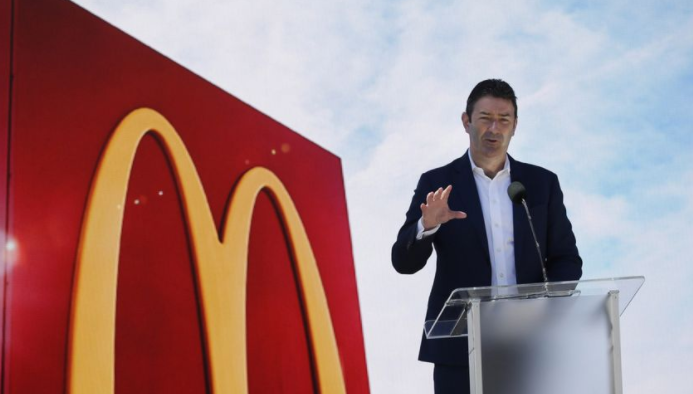Ex-McDonald’s CEO Fires Back at Chain’s Effort to Strip Pay
Easterbrook
denies he covered up relationships with employees
McDonald’s sued executive over sexual relations with workers

McDonald’s Corp.’s former Chief Executive Officer Steve Easterbrook fired back
at his former company for suing to clawback tens of millions of dollars in
compensation, denying company claims he covered up sexual relationships with
subordinates.
McDonald’s officials claimed that after firing Easterbrook last year they found
new information that showed the former top executive “concealed evidence and
lied about his wrongdoing.” Easterbrook says McDonald’s had the information
about his relationships with employees when it negotiated his separation
agreement.
“McDonald’s -- a sophisticated entity represented by numerous internal and
external experts when it entered into the separation agreement -- is aware it
cannot credibly allege a breach of contract claim,” Easterbrook’s lawyers said
Friday in a filing Delaware Chancery Court, seeking to have the lawsuit thrown
out. “Instead, it improperly seeks to manufacture claims for a breach of
fiduciary duty or fraud.”
It’s the latest salvo in a legal battle over Easterbrook’s ouster, which was
covered by the severance agreement that allowed him to keep stock awards worth
more than $37 million as well as $675,000 severance and health insurance
benefits.
“McDonald’s stands by its complaint, both the factual assertions and the
court in which it was filed,” the company said.
&uuid=(email))
Easterbrook also claims agreements covering stock grants targeted by the company
must be heard in Illinois courts, where McDonald’s is based. He also accused the
chain of filing the lawsuit knowing he couldn’t immediately respond because of a
gag clause in the agreement.
“McDonald’s Corporation filed a meritless -- and misleading -- lawsuit in the
wrong forum,” Easterbrook’s lawyers said.
While McDonald’s is based in Illinois, it’s incorporated in Delaware. The
chancery court in the state is the premier venue for resolving high-profile
corporate disputes.
In return for his severance package, Easterbrook agreed to a two-year
non-compete clause specifying more than 40 companies that he couldn’t join. He
was also required to write a letter “to employees acknowledging that he made a
mistake,” according to the filing.
The case is McDonald’s Corp. v. Easterbrook, 2020-0658, Delaware Chancery Court
(Wilmington).
bloomberg.com
usatoday.com
Editor's Note: Obviously, Easterbrook has to put up a defense
regardless of the outcome and try to minimize the reputation hit and possibly
limit the clawback. Which quite frankly given the investigative and forensic
findings, if valid and accurate, are insurmountable. Even with or without
permission, emailing nude photos of employees is probably enough.
And it was obvious that Easterbrook fast talked the board, deleted a bunch of
files on his personal business computers and cell phones, enough to pass a
superficial investigation, probably humbly admitted to relations with one, which
they accepted and agreed to let him resign without cause and keep his severance.
Which has been quoted as ranging from $35M to $57M.
The issue here is that Easterbrook probably committed fraud by lying and
making misrepresentations to the board and deleting files from his business
computer, which played the central part in his earning the severance package.
Without both of which, he would have been fired for cause and not
qualified to receive the severance package.
1 Critical factor here: If it had not been for the July anonymous tip
after a town hall meeting, no one would have taken a more detailed second
look and found the forensic computer data and nude photos. And secondly,
as WSJ stated, where was the compliance and governance process during the
initial investigation?
Lastly, does Ill. State Attorney Kim Foxx even look at it as a fraud?
Obviously it may do wonders for her political career. But then again we've only
seen one tried for such offenses back in the early 90s when the former Vice
Chairman of Walmart Tom Coughlin (initially an LP executive) was convicted for
expense fraud. Who, by the way, was also identified by an anonymous tip.
This may end up being the biggest retail CEO outright fraud ever, if proven by
the reported evidence.
One more thing: If the facts hold up as presented, his only defense could be
that he did not intentionally hide the evidence (photos) and simply wasn't asked
about any other possible sexual relationships. Technical loopholes so to speak,
but loopholes nonetheless. Which makes the boards initial handling of this even
more superficial and absolutely negligent. More fuel for the negligence lawsuit.
By the way, this one isn't going away anytime soon and will end up being in the
academic history books and reviewed in business schools for decades as a
real-world example.
For a more detailed review read our
initial report.